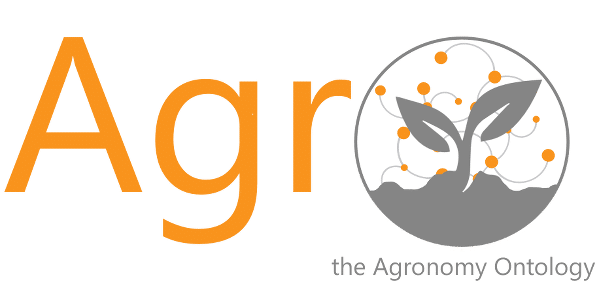
Photo: Anindya Phani
About AgrO
An ontology is a formal representation of a disciplinary domain, representing a semantic standard that can be employed to annotate data where key concepts are defined, as well as the relationships that exist between those concepts (Gruber, 2009). Ontologies provide a common language for different kinds of data to be easily interpretable and interoperable allowing easier aggregation and analysis.
The Agronomy Ontology (AgrO) provides terms from the agronomy domain that are semantically organized and can facilitate the collection, storage and use of agronomic data, enabling easy interpretation and reuse of the data by humans and machines alike.
To fully understand the implications of varying practices within cropping systems and derive insights, it is often necessary to pull together information from data in different disciplinary domains. For example, data on field management, soil, weather and crop phenotypes may need to be aggregated to assess performance of particular crop under different management interventions.
However, agronomic data are often collected, described, and stored in inconsistent ways, impeding data comparison, mining, interpretation reuse. The use of standards for metadata and data annotation play a key role in addressing these challenges. While the CG Core Metadata Schema provides a metadata standard to describe agricultural datasets, the Agronomy Ontology enables the description of agronomic data variables using standard terms.
AgrO is being built from traits and parameters identified by agronomists, the ICASA Data Dictionary, and other existing ontologies such as the Environment Ontology, the Unit Ontology, and the Phenotype and Trait Ontology and enriched with the support of several scientists who bring their domain knowledge.
Contact us
Céline Aubert
Consultant – IFPRI
Email: aubertceline@ymail.com
Marie-Angélique Laporte
Associate Scientist
Alliance Bioversity International-CIAT
Email: m.a.laporte@cgiar.org
Elizabeth Arnaud
Scientist | Email
Alliance Bioversity International-CIAT
Email: e.arnaud@cgiar.org
Medha Devare
Senior research fellow | Module lead Big Data Platform
IFPRI
Email: m.devare@cgiar.org
Core team
AgrO has been developed by a team from several CGIAR Research Centers, with input and support from experts at other institutions.

Medha Devare
Project Lead | Senior Research Fellow - IFPRI, Module Lead - CGIAR Platform for Big Data in Agriculture

Elizabeth Arnaud
Project Co-Lead | Scientist - Alliance Bioversity International-CIAT

Marie-Angélique Laporte
Ontology Expert and AgrO Developer | Associate Scientist - Alliance Bioversity International-CIAT

Key contributors
Pier Luigi Buttigieg
Data Scientist - Alfred Wegener Institute
Léo Valette
Research assistant - Bioversity International (2015-2016)
Cheryl Porter
Coordinator, Computer Applications – University of Florida
Chris Mungall
Department Head, Molecular Ecosystems Biology, Berkeley Lab
Julian Pietragalla
Regional Deployment Manager, Latin America - IBP
Adopters
AgroFIMS
A key use case for AgrO is the Agronomy Field Information Management System (AgroFIMS). AgroFIMS enables digital collection of agronomic data that is semantically described a priori with agronomic terms from AgrO.
It consists of a web application used to design data collection templates for agricultural experiments by selecting variables annotated with AgrO and other relevant ontologies. These variables are sorted into a series of modules representing the typical cycle of operations in agronomic trial management, such as land preparation, irrigation, weeding, soil fertility, weather and soil parameters, and more. The field book application allows the creation of data collection sheets enabling standardization in data collection and description and linkages with breeding and other related data. In addition, AgroFIMS promotes digital collection of data to reduce error and ease data collection via the mobile apps: KDSMart, ODK, and Field Book.
The Agricultural Model Intercomparison and Improvement Project (AgMIP)
AgrO is being used by the University of Florida (UF), and researchers associated with the Agricultural Model Intercomparison and Improvement Project (AgMIP) and IFPRI as a standard reference terminology to enable the generation and reuse of model-ready data.
The goal of this effort is to facilitate data queries in GARDIAN that include a measure of the appropriateness of each dataset for use in quantitative analyses. Each dataset will include metadata that fully describe the terminology used in that dataset with links to AgrO definitions and units.
Learn more: GARDIAN and facilitating data interoperability at CGIAR – Blog post – 12 February 2019
Browse AgrO
Structure
The backbone of AgrO is based on formal categories from the Basic Formal Ontology (BFO) shared by the ontologies of the Open Biological and Biomedical Ontology (OBO) Foundry family.
The mission of the OBO Foundry is to develop a family of interoperable ontologies that are both logically well-formed and scientifically accurate. Therefore, some terms in the AgrO ontology tree are generic, but necessarily so for AgrO to be interoperable with other ontologies. In further efforts towards such interoperability, AgrO reuses and builds on existing terms from other ontologies, thus minimizing term proliferation and duplication across multiple ontologies (c.f. table). This means that some terms in the AgrO ontology tree may be generic, but this is necessary for AgrO to be interoperable with other ontologies.
Table: Ontologies used in AgrO
| Ontology acronym | Ontology full name | Ontology content used in AgrO | Example of terms |
| BFO | Basic Formal Ontology | Foundation of the ontology | entity, continuant, occurrent |
| ChEBI | Chemical Entities of Biological Interest | Chemical entities along with their biochemical role | role fertilizer, chemical entity |
| ENVO | Environment Ontology | Environments and entities | animal manure, soil, field |
| IAO | Information Artifact Ontology | Information entities. Entends OBI |
assay, has measurement datum has time stamp |
| OBI | Ontology for Biomedical Investigations | Study design, protocols and instrumentation |
achieves_planned_objective objective_achieved_by |
| PATO | Phenotype And Trait Ontology | Qualities of entities | adjacent to, contributes to, concentration of, |
| PECO | Plant Experimental Condition Ontology | Abiotic treatments, growing conditions and study types | silt content exposure, clay content exposure |
| PO | Plant Ontology | Plant anatomy, morphology and growth | leaf, bud, seed |
| TO | Plant Trait Ontology | Phenotypic traits in plants | yield trait |
| UO | Unit Ontology | Units | m, kg, L |
Searching terms within AgrO
The Ontology Lookup Service of the European Biological Institute (OLS-EBI) allows an online search of the ontology.
To find a term, simply type it in the search box of the OLS tool below. You can also navigate into the tree using the + sign on the left side of the terms.
You can also query the OLS API directly by modifying the R script available here.
Download AgrO
AgrO developments are openly available on the Agricultural Semantics GitHub repository.
AgrO can be downloaded here. This file is readable using ontology editors like the software Protegé (using the ‘open from URL’ option for instance).
R users may download and parse AgrO as needed by modifying the script available here.
navigate AgrO
Main categories in AgrO
The ontology has been categorized in different classes, following the backbone of the OBO foundry ontologies. Below are the details of the hierarchy of the main AgrO classes to help you navigate the ontology tree.
| Entity |
Process (Entity>occurrent>process>planned process) every planned and unexpected “event” happening in the field |
|
|
Material and immaterial entity (Entity>continuant>independent continuant) Every object/organism involved in an agricultural experiment |
|
|
|
Quality (entity>continuant>specifically dependent continuant) characteristic of an entity or a process |
|
|
|
Plan specification (entity>continuant>generically dependent continuant>information content entity>directive information entity) method or protocol realized during a process |
|
|
|
Role behavior of a material entity |
|
|
|
Unit unit of measurement |
All these classes interact via relations described in the ontology.
For example:
- The term: tillage process is linked to the terms soil, tractor and tillage implement with the relation has participant.
- The term animal manure is linked to the term organic fertilizer, with the relation has role.
- Agricultural experimental Plot contains process agricultural experiment
Citation
We request that users cite the ontology using the following citation:
Aubert C., Buttigieg P.L., Laporte M.A., Devare M., Arnaud E., (2017) CGIAR Agronomy Ontology, http://purl.obolibrary.org/obo/agro.owl, licensed under CC BY 4.0
This Creative Commons Attribution 4.0 International License allows you to:
- Share — copy and redistribute the material in any medium or format
- Adapt — remix, transform, and build upon the material for any purpose, even commercially.
Under the following terms:
- Attribution — You must give appropriate credit, provide a link to the license, and indicate if changes were made.
- No additional restrictions — You may not apply legal terms or technological measures that legally restrict others from doing anything the license permits.
Reference
Data-driven Agricultural Research for Development: A Need for Data Harmonization Via Semantics. Devare M., Aubert C., Laporte M.A., Valette L., Arnaud E., Buttigieg P.L.. Proceedings of the Joint International Conference on Biological Ontology and BioCreative, Corvallis, Oregon, United States, August 1-4, 2016. http://ceur-ws.org/Vol-1747/IT205_ICBO2016.pdf
Participate
If you would like to ask for a new term or synonym, suggest enhancements, or report an error please open a ‘’New Issue’’ in our GitHub issue tracker.
In the title of the issue, add the term you wish to add or modify. In the comment of the issue, add the terms’ definition, its reference and its location in the ontology’s tree.
For any other request, feel free to contact us and register to the agronomy ontology mailing list: agronomyOntology@googlegroups.com.



